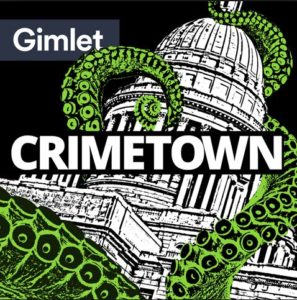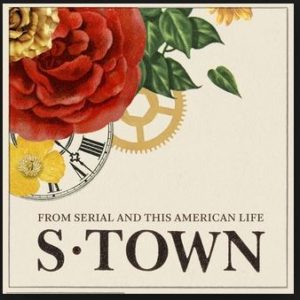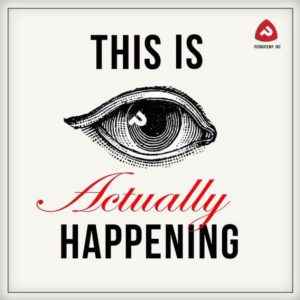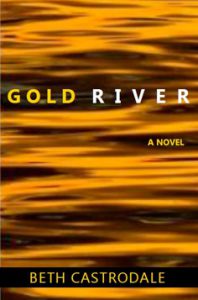The late 1990s and early 2000s marked the dawn of what some refer to as a second Golden Age of Television. At the time, several smart, novelistic TV series (such as “The Sopranos,” “Six Feet Under,” and “The Wire”) were launched, making way for further innovation in televised entertainment. I would argue that, today, we’re witnessing The Golden Age of Podcasts, for it seems that every day, a new must-listen podcast is making its début.
My personal favorites do an exceptional job of telling true stories: the stranger and more surprising, the better. Here, I’ll share a selection of such podcasts. (If you’re interested in podcasts that feature fictional works, you might check out one or more of the scripted audio series that have been released recently, some of them calling to mind old-style radio dramas.)
 Crimetown Each season of this podcast is slated to investigate “the culture of crime in a different American city.” Crimetown’s premiere season focuses on Providence, Rhode Island, and the interweaving of organized crime and political corruption during the rise—and fall—of Providence’s notorious mayor Vincent Albert “Buddy” Cianci Jr. In the words of the producers, “This is a story of alliances and betrayals, of heists and stings, of crooked cops and honest mobsters—a story where it’s hard to tell the good guys from the bad guys.” Indeed. If you loved the cable drama “The Wire” as much as I did, there’s a good chance you’ll enjoy “Crimetown,” too.
Crimetown Each season of this podcast is slated to investigate “the culture of crime in a different American city.” Crimetown’s premiere season focuses on Providence, Rhode Island, and the interweaving of organized crime and political corruption during the rise—and fall—of Providence’s notorious mayor Vincent Albert “Buddy” Cianci Jr. In the words of the producers, “This is a story of alliances and betrayals, of heists and stings, of crooked cops and honest mobsters—a story where it’s hard to tell the good guys from the bad guys.” Indeed. If you loved the cable drama “The Wire” as much as I did, there’s a good chance you’ll enjoy “Crimetown,” too.
 Criminal Through original reporting, including interviews with criminals, victims, and other sources, each episode of this podcast tells a riveting true-crime story, but not the type you’ll encounter in the typical televised dramas. The show’s broader definition of “crime” means it takes listeners to unexpected, and fascinating, places. For example, one of my favorite episodes, “The Big Lick,” examines the open secret behind the crowd-pleasing high-stepping of Tennessee Walking Horses, shedding light on a cruel and unethical practice, and on the criminal ends to which some people will go to preserve it.
Criminal Through original reporting, including interviews with criminals, victims, and other sources, each episode of this podcast tells a riveting true-crime story, but not the type you’ll encounter in the typical televised dramas. The show’s broader definition of “crime” means it takes listeners to unexpected, and fascinating, places. For example, one of my favorite episodes, “The Big Lick,” examines the open secret behind the crowd-pleasing high-stepping of Tennessee Walking Horses, shedding light on a cruel and unethical practice, and on the criminal ends to which some people will go to preserve it.
As Criminal’s host, Phoebe Judge, told Metro USA, “We always wanted to explore the boundaries of what this word ‘crime’ meant. It was exciting for us because we thought we could surprise people. We took the broadest definition of the word ‘crime’ and that means some of the stories are funny! I think we have this idea that we need to pigeonhole true crime into this one category. Often times that category is dark, sad, tragic, and often times violent. We wanted to do the exact opposite. We wanted to have a show that very rarely showed violence and tragedy but rather showed crime as a conversation about the human experience.”
 Love + Radio This intense, strange, and captivating show features documentary-style storytelling based on interviews with (in the words of L + R) “an eclectic range of subjects, from the seedy to the sublime.” As a good starter episode, I’d recommend “The Machine,” which tells the tale of Marvin Heemeyer, who becomes enraged by rezoning that allows a concrete factory to be built across the street from his muffler shop, something he sees as a threat to his livelihood. Fueled by his anger, Heemeyer converts a bulldozer into an armored, tank-like weapon of war, and seeks to exact revenge on those he holds responsible for his changed circumstances.
Love + Radio This intense, strange, and captivating show features documentary-style storytelling based on interviews with (in the words of L + R) “an eclectic range of subjects, from the seedy to the sublime.” As a good starter episode, I’d recommend “The Machine,” which tells the tale of Marvin Heemeyer, who becomes enraged by rezoning that allows a concrete factory to be built across the street from his muffler shop, something he sees as a threat to his livelihood. Fueled by his anger, Heemeyer converts a bulldozer into an armored, tank-like weapon of war, and seeks to exact revenge on those he holds responsible for his changed circumstances.
In the words of This American Life host Ira Glass, Love + Radio “has some of the most emotionally complicated stories and portraits of people that anyone is doing anywhere.”
 S-Town With its dark, twist-and-turn complexity, this seven-episode podcast calls to mind a Southern gothic novel. The story begins in 2012, when Brian Reed, a longtime producer of This American Life gets an email with this subject line “John B McLemore lives in Shittown Alabama.” Reed ends up entering into an extended correspondence with the email’s author, McLemore, who alleges that a murder has been covered up in his central-Alabama hometown, and urges This American Life staff to look into it.
S-Town With its dark, twist-and-turn complexity, this seven-episode podcast calls to mind a Southern gothic novel. The story begins in 2012, when Brian Reed, a longtime producer of This American Life gets an email with this subject line “John B McLemore lives in Shittown Alabama.” Reed ends up entering into an extended correspondence with the email’s author, McLemore, who alleges that a murder has been covered up in his central-Alabama hometown, and urges This American Life staff to look into it.
Eventually, Reed travels to Alabama to do just that. But instead of solving a murder mystery, Reed becomes immersed in the mystery that McLemore, a brilliant and troubled man, represents, and he learns more about the community with which McLemore had become so disenchanted. Through in-depth reporting and thoughtful, introspective narration, Reed makes listeners feel as engaged in McLemore’s story as he was.
 Snap Judgment Each episode of the Snap Judgment radio program (and podcast) groups stories around a certain theme, and these stories often focus on big life decisions or turning points.
Snap Judgment Each episode of the Snap Judgment radio program (and podcast) groups stories around a certain theme, and these stories often focus on big life decisions or turning points.
One of the show’s stated goals is to challenge listeners “to see the world through the eyes of another.” As the show’s host, Glynn Washington, told The Guardian, “We want to do deep dives to help people really understand another person’s experience. The only way to report that is through storytelling – what happened to one person. Maybe the listener wouldn’t have done the same thing, but at least they get a taste of the world in which that person operates. That’s magic.”
My personal Snap Judgment favorite is the series of “Spooked” episodes it releases every fall, just in time for Halloween. “Spooked” features frightening tales like “A Friend in the Forest,” in which a social worker, Shane Dunphy, is tasked with figuring out why a little boy, Gregory, has been sneaking away from his home at night and escaping into the woods. When Gregory tells Dunphy that another boy, Thomas, has been coming to his window at night and summoning him outdoors, Dunphy suspects that Thomas is an imaginary friend—until new information leads him to far more chilling conclusions.
 This Is Actually Happening In each episode of this podcast, people speak, without outside commentary or other interruptions, about a life-changing experience. In the words of the Atlantic, which named This Is Actually Happening one of the 50 best podcasts of 2017, “This creates an intimate connection with the speaker, perhaps the closest thing listeners have to trying on another person’s consciousness.”
This Is Actually Happening In each episode of this podcast, people speak, without outside commentary or other interruptions, about a life-changing experience. In the words of the Atlantic, which named This Is Actually Happening one of the 50 best podcasts of 2017, “This creates an intimate connection with the speaker, perhaps the closest thing listeners have to trying on another person’s consciousness.”
In each episode, the speaker responds to a “What if” statement, such as “What if your origins were a mystery?” “What if you spent 15 hours on the edge of sanity?” and “What if you woke up in the morgue?”
For me, one of the most compelling episodes was “What if the happiest place on earth was your worst nightmare?” The happiest place on earth turns out to be Disneyland, which the two sisters who are the subjects of the episode were made to go to for years by their “schoolyard bully” of a father. “I remember the first trip being good,” says one of the sisters. “And then it slowly progressed into something a little abnormal.” (The podcast doesn’t identify speakers, so I’m not able to attribute quotations more specifically.)
The abnormal—and bullying—aspects included being forced to participate in hours and hours of trip planning, to go on hated or feared rides (such as the Haunted Mansion), and to watch a seemingly endless series of Disney movies. Reflecting on the experience, one of the sisters says, “I don’t know if anyone’s ever been in a situation where they’re forced to try and enjoy themselves or have a good time, but it’s not fun.” Fortunately, the sisters were able to gain a measure of freedom, and the podcast ends on a hopeful note.

Hey Beth,
I just finished listening to S-Town last week. I found it thoroughly depressing, but fascinating. Love the journey the reporter Brian Reed showed us. Will check out some of your other recommendations, thank you! Patty
Hey Patty–
Yes, it was a sad story in so many ways. But I also loved Brian Reed’s telling of the story. And the details about clock making were fascinating. (I must spend some time looking into astrolabes.)